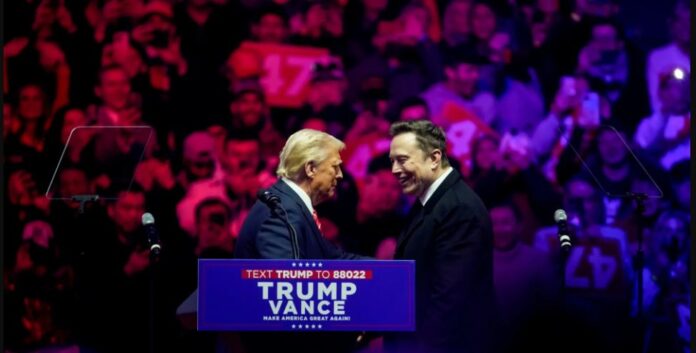The second Trump administration has moved swiftly to test the limits of executive authority, sparking intense legal scrutiny and raising concerns over a potential constitutional crisis. While the president’s supporters praise his aggressive approach, legal experts warn that several of his administration’s recent actions may be on precarious legal footing, with challenges likely to unfold in courtrooms for years to come.
From efforts to dismantle independent agencies to granting private individuals access to sensitive government systems, Trump’s executive maneuvers are already prompting lawsuits and congressional pushback. Here’s a closer look at the most controversial initiatives and the legal questions they raise.
Also Read: US Court Blocks Trump’s Federal Buyout Plan—For Now
Dissolving USAID: Can Trump Unilaterally Shut It Down?
The future of the U.S. Agency for International Development (USAID) is uncertain after Trump signaled plans to eliminate its independence and place it under State Department control. USAID, a key player in U.S. foreign policy, administers billions of dollars in humanitarian aid, global health programs, and democracy-building initiatives across 120 countries. The agency has long been a target of Trump’s campaign to reduce federal spending, with the president arguing that it prioritizes global interests over American needs.
Legal Hurdles:
Legal experts assert that Trump lacks the constitutional authority to shut down USAID without congressional approval. While the agency was originally created through an executive order by President John F. Kennedy in 1961, Congress formally established it as an independent entity under the Foreign Affairs Reform and Restructuring Act of 1998.
“The president cannot unilaterally abolish a congressionally established agency,” says Saikrishna Prakash, a constitutional law professor at the University of Virginia. “Any attempt to dissolve USAID would require new legislation.”
Even if Trump sought to defund USAID’s programs, he would likely face legal barriers under the Impoundment Control Act of 1974, which prevents the president from withholding congressionally approved funds without legislative consent. The dispute could ultimately reach the Supreme Court.
On Monday, congressional Democrats protested outside USAID headquarters after reports that agency staff had been instructed to work remotely. Representative Don Beyer condemned the administration’s actions, stating, “USAID was established by Congress and can only be dismantled by Congress.”
Granting Elon Musk’s DOGE Access to Sensitive Treasury Data
In a move raising alarm over privacy and security, Treasury Secretary Scott Bessent has granted Elon Musk’s Department of Government Efficiency (DOGE) access to the federal payment system, which processes over $5 trillion annually in Social Security, Medicare, and tax refunds.
Critics argue that Musk, whose companies hold significant government contracts, should not have access to such sensitive information, warning that it could be misused for political or financial gain. Proponents claim DOGE’s oversight will eliminate inefficiencies and reduce government waste.
Legal Challenges:
Experts contend that the move could violate multiple federal statutes, including:
The Privacy Act of 1974, which restricts unauthorized disclosures of personal data.
The Federal Information Security Modernization Act (FISMA), which mandates strict security controls for federal IT systems.
The Computer Fraud and Abuse Act (CFAA), which criminalizes unauthorized access to government networks.
“DOGE’s access to Treasury data is a flagrant violation of the Privacy Act,” says Alan Butler, executive director of the Electronic Privacy Information Center. “Musk’s team has already posted specific payment records online—this is unauthorized disclosure of federal data.”
Perhaps most concerning is the potential breach of Internal Revenue Code Section 6103, which strictly limits access to taxpayer information. The Nixon administration’s past misuse of tax records to target political opponents led to stringent protections that even the president cannot override.
A lawsuit filed Monday by two major federal employee unions accuses the administration of breaching privacy laws, setting the stage for a protracted legal battle.
Trump’s Controversial Federal Employee Buyout Program
On January 28, federal employees received an unexpected offer from the Office of Personnel Management (OPM): resign by February 6 and receive eight months of pay and benefits, or return to full-time in-office work.
Trump has framed the buyout as a measure to shrink the federal workforce and improve efficiency. However, legal experts warn that the program may run afoul of federal laws governing government spending and employee rights.
Legal Risks:
One key concern is the Anti-Deficiency Act, which prohibits the government from committing funds beyond what Congress has appropriated. With government funding set to expire in mid-March, experts question whether the administration has the legal authority to promise payments extending beyond that period.
“The Anti-Deficiency Act makes it illegal for agencies to obligate future funds without congressional approval,” explains Nick Bednar, a law professor at the University of Minnesota. “The deferred resignation program could violate this law.”
Additionally, the Administrative Leave Act of 2016 restricts how federal employees can be placed on leave, preventing agencies from sidelining workers for extended periods without justification. Some legal scholars argue that Trump’s buyout plan, which effectively places employees on paid leave for eight months, contradicts these provisions.
Despite assurances from OPM that departing employees will receive back pay as required under federal law, uncertainty over funding has left many workers hesitant to accept the offer.
The Road Ahead: Legal Battles and Congressional Showdowns
Trump’s sweeping executive actions have already triggered lawsuits and congressional opposition, with legal experts predicting drawn-out court battles over the extent of presidential power. As challenges mount, the administration’s ability to push forward with its agenda will likely depend on the judicial system’s interpretation of executive authority.
While Trump has dismissed concerns, stating that “everything is being done by the book,” the coming months will determine whether his administration’s actions withstand legal scrutiny—or set the stage for a constitutional crisis.



